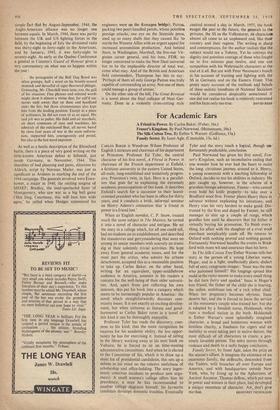For Academic Ears
A Friend in Power. By Carlos Baker. (Faber, 16s.) „ CARLOS BAKER is Woodrow Wilson Professor of English Literature and chairman of his department at Princeton. Professor Ed Tyler, the central character of his first novel, A Friend in Power, is chairman of the French department at Enfield, a fictitious university in the eastern United States, all-male, long-established and tentatively progres- sive, Princeton's twin, in fact. Here is a parallel- ism that goes far to explaining the extremely academic preoccupations of this book. It describes Enfield's search for a successor to their laurel- crowned president who has been in office for thirty years, and it conducts a brisk, informal seminar on Henry Adams's contention that `a friend in power is a friend lost.'
When an English novelist, C. P. Snow, treated much the same subject in The Masters, he turned it into a novel of character and intrigue. He set the story in a college which, for all one could tell, had no students on its establishment, and described the manoeuvres and gerrymandering that went on among its senior members with scarcely an ironic dig at their solemnly trivial activities. He kept away from 'general academic issues, and for the most part the critics, who admire his urbane detachment, accepted this as a reasonable position to take up. Carlos Baker, on the other hand, writing for an equivalent, upper-middlebrow audience in America, assumes in his readers a concern for the well-being of their older universi- ties. And, apart from just reflecting his own interests, this put his book into a category which seems to be increasingly popular in America : the novel which straightforwardly discusses com- munity issues. It is not exactly an exciting develop- ment, but when someone as literate and good- humoured as Carlos Baker turns in a novel of this kind it can be thoroughly enjoyable.
Professor Tyler has made the discovery, com- mon to his kind, that the more recognition he receives for his academic ability, the less oppor- tunity he has for exercising it. Instead of sitting in the library working away at his next book on Voltaire, he is forced to sit on titne-wasting administrative committees. And when he is elected to the Committee of Six, which is to draw up a short list of presidential candidates, this sets up a debate in his mind on the relative usefulness of scholarship and office-holding. The story ingen- iously contrives incidents to produce new argu- ments. A small women's college offers him its presidency; a man he has recommended to another college disgraces himself; his favourite candidate develops domestic troubles. Eventually
Tyler and the story reach a logical, though un- fortunately predictable, conclusion.
Paul Norwood has given his first novel, Fen- ner's. Kingdom, such an inconclusive ending that you wonder how he ever had the heart to make the long, circuitous journey around to it. Henry, a young economist with a teaching fellowship at Oxford, decides to test his abilities in industry. He gets caught up, however, in the scheme of a graceless foreign adventurer, Fenner—who cannot even hold his knife properly—to take over a Bradford wool firm. Fenner plants Henry there in advance without explaining his intentions, and Henry tries his very hardest to make good. Dis- trusted by the firm and duped by Fenner, he still manages to shin up a couple of rungs, which gratifies him until he discovers that his father is virtually' buying his promotion. To finish every- thing, his affair with the daughter of a rival wool merchant inexplicably cools off. He returns to Oxford with nothing proved and nothing gained. Fortunately Norwood handles the events in Brad- ford with more wit and assurance than his hero.
In The Silk-Cotton Tree Esther Warner tells her story in the person of a young Liberian nurse, Hagar, and in a light, unaffectedly pbetic dialect full of easy, congruous images : `Isaac was the one who jealoused himself! His longings spread like mold in the rainy season to make every small thing he did turn furry and spoiled.' Isaac is Hagar's boy friend, the father of the child she is bearing, the sullen, ambitious son of a rich tribal chief. When her pregnancy becomes obvious, Isaac deserts her, and she is forced to leave the service of the missionary couple who trained her; but she is adopted by a Swedish nurse, Huldamah, who runs a medical station in the bush. Huldamah is Esther Warner's most splendidly imagined character, a broad and boisterous woman with limitless charity, a fondness for cigars and an inability to resist taking part in native dances, the most difficult of all characters to create, a gen- uinely loveable person. The story moves through violence and death to a sadly, happy conclusion.
Family Secret, by Janet Agle, takes the prize as the season's silliest. It imagines the existence of an enormous family, the deBrachs, descended from the Tudors, with branches all over Europe and America, and with headquarters outside New York, who, by living up to the Aphorisms of Ancient Ancestor, Thomas deBrac, which put men in power and women in their place, had developed a unique sweetness of character. Aw, don't give


































 Previous page
Previous page